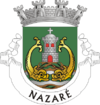Nazaré, Portugal
| Nazaré | |||
|---|---|---|---|
| Municipality | |||

Nazaré, Praia and Pederneira, seen from Sítio
|
|||
|
|||
 |
|||
| Coordinates: 39°36′N 9°04′W / 39.600°N 9.067°WCoordinates: 39°36′N 9°04′W / 39.600°N 9.067°W | |||
| Country |
|
||
| Region | Centro | ||
| Subregion | Oeste | ||
| Intermunic. comm. | Oeste | ||
| District | Leiria | ||
| Parishes | 3 | ||
| Government | |||
| • President | Walter Chicharro (PS) | ||
| Area | |||
| • Total | 82.43 km2 (31.83 sq mi) | ||
| Population (2011) | |||
| • Total | 15,158 | ||
| • Density | 180/km2 (480/sq mi) | ||
| Time zone | WET/WEST (UTC+0/+1) | ||
| Website | http://www.cm-nazare.pt | ||
Nazaré (Portuguese pronunciation: [nɐzɐˈɾɛ]) is a town and a municipality in subregion Oeste and Leiria District, in Portugal.
It is one of the most popular seaside resorts in the Silver Coast/Costa de Prata, Portugal. The population in 2011 was 15,158, in an area of 82.43 km². The present Mayor is Walter Chicharro, elected by the Socialist Party (Portugal). The municipal holiday is September 8 with the Festas da Nazaré a religious and profane festival with processions, bullfights, fireworks, folk dancing and a fair.
The town consists of three neighbourhoods: Praia (along the beach), Sítio (an old village, on top of a cliff) and Pederneira (another old village, on a hilltop). Praia and Sítio are linked by the Nazaré Funicular, a funicular railway.
The earliest settlements were in Pederneira and in Sítio, above the beach. They provided the inhabitants with refuge against raids by Viking, later French, English and Dutch pirates, that lasted until as late as the beginning of the 19th century.
According to the Legend of Nazaré, the town derives its name from a small wooden statue of the Virgin Mary, a Black Madonna, brought by a monk in the 4th century from Nazareth, Holy Land, to a monastery near the city of Mérida, Spain. The statue was brought to its current place in 711 by another monk, Romano, accompanied by Roderic, the last Visigoth king of today's Portugal. After their arrival at the seaside they decided to become hermits. The monk lived and died in a small natural grotto, on top of a cliff above the sea. After his death and according to the monk's wishes, the king buried him in the grotto. Roderic left the statue of the Black Madonna in the grotto on an altar.
...
Wikipedia


